陕旅版六年级英语上册 Unit 1
- 格式:pptx
- 大小:12.42 MB
- 文档页数:89
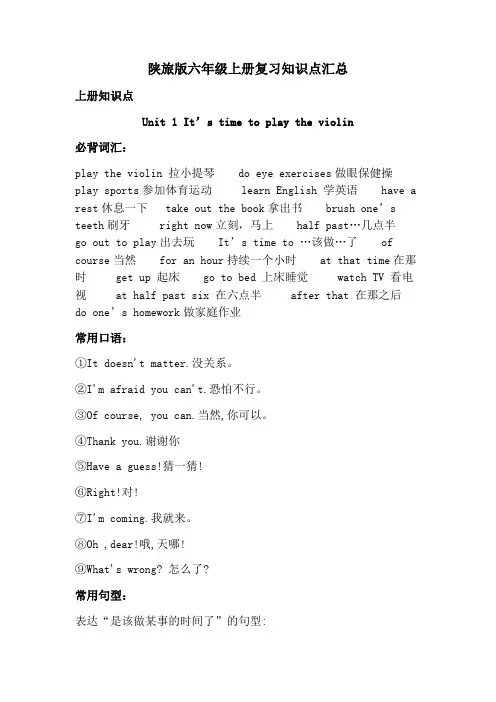
陕旅版六年级上册复习知识点汇总上册知识点Unit 1 It’s time to play the violin必背词汇:play the violin 拉小提琴 do eye exercises做眼保健操play sports参加体育运动 learn English 学英语 have a rest休息一下 take out the book拿出书 brush one’s teeth刷牙 right now立刻,马上 half past…几点半go out to play出去玩 It’s time to …该做…了 of course当然 for an hour持续一个小时 at that time在那时 get up 起床 go to bed 上床睡觉 watch TV 看电视 at half past six 在六点半 after that 在那之后do one’s homework做家庭作业常用口语:①It doesn't matter.没关系。
②I'm afraid you can't.恐怕不行。
③Of course, you can.当然,你可以。
④Thank you.谢谢你⑤Have a guess!猜一猜!⑥Right!对!⑦I'm coming.我就来。
⑧Oh ,dear!哦,天哪!⑨What's wrong? 怎么了?常用句型:表达“是该做某事的时间了”的句型:It's time to play the violin.It's time to do eye exercises.It's time to have a rest.描述某人的日常习惯的句型Li Shan always gets up at half past six.Jim always reads books on weekends.I always play football after school.Unit 2 I’m healthy必背词汇:take a walk散步 lay ping-pong打乒乓球 play tennis 打网球 go boating去划船 go skating去滑冰 go shopping去购物 look healthy看起来健康 healthy food 健康的食物 drink milk 喝牛奶 a lot of许多 how often多久一次 every day每天 be good for对…好,对…有益 in the morning在上午 in the afternoon在下午 twice a week一周两次 once a month一月一次three times三次 do well in在……做得好 be good at 擅长…… run after追赶 in the day在白天 at night在晚上常用口语:Really? 真的吗?0h,no!哦,不!Sorry ,I don’t know.对不起,我不知道。
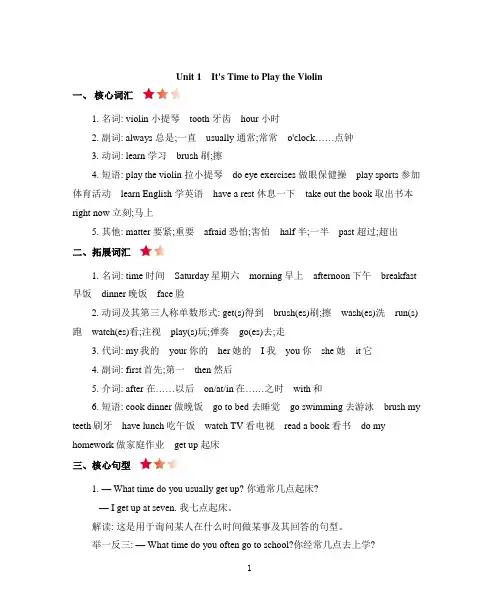
Unit 1It's Time to Play the Violin一、核心词汇1. 名词: violin 小提琴tooth 牙齿hour 小时2. 副词: always 总是;一直usually 通常;常常o'clock……点钟3. 动词: learn 学习brush 刷;擦4. 短语: play the violin 拉小提琴do eye exercises 做眼保健操play sports 参加体育活动learn English 学英语have a rest 休息一下take out the book 取出书本right now 立刻;马上5. 其他: matter 要紧;重要afraid 恐怕;害怕half 半;一半past 超过;超出二、拓展词汇1. 名词: time 时间Saturday星期六morning早上afternoon下午breakfast 早饭dinner晚饭face脸2. 动词及其第三人称单数形式: get(s)得到brush(es)刷;擦wash(es)洗run(s)跑watch(es)看;注视play(s)玩;弹奏go(es)去;走3. 代词: my我的your你的her她的I我you你she她it它4. 副词: first首先;第一then 然后5. 介词: after 在……以后on/at/in在……之时with和6. 短语: cook dinner 做晚饭go to bed 去睡觉go swimming 去游泳brush my teeth刷牙have lunch吃午饭watch TV 看电视read a book 看书do my homework 做家庭作业get up 起床三、核心句型1. — What time do you usually get up? 你通常几点起床?— I get up at seven. 我七点起床。
解读: 这是用于询问某人在什么时间做某事及其回答的句型。
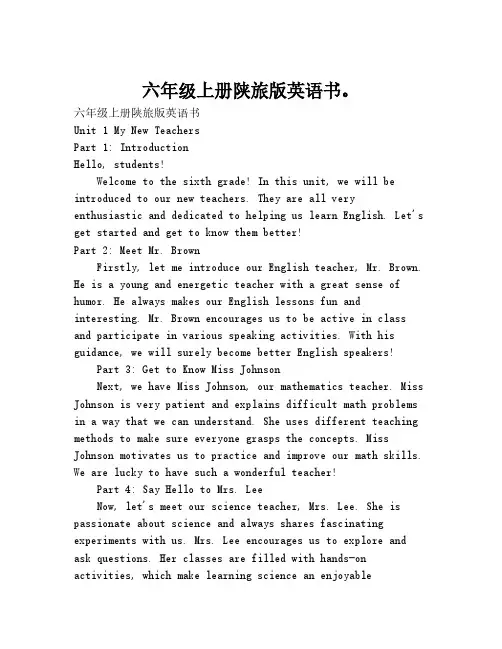
六年级上册陕旅版英语书。
六年级上册陕旅版英语书Unit 1 My New TeachersPart 1: IntroductionHello, students!Welcome to the sixth grade! In this unit, we will be introduced to our new teachers. They are all veryenthusiastic and dedicated to helping us learn English. Let's get started and get to know them better!Part 2: Meet Mr. BrownFirstly, let me introduce our English teacher, Mr. Brown. He is a young and energetic teacher with a great sense of humor. He always makes our English lessons fun and interesting. Mr. Brown encourages us to be active in class and participate in various speaking activities. With his guidance, we will surely become better English speakers!Part 3: Get to Know Miss JohnsonNext, we have Miss Johnson, our mathematics teacher. Miss Johnson is very patient and explains difficult math problems in a way that we can understand. She uses different teaching methods to make sure everyone grasps the concepts. Miss Johnson motivates us to practice and improve our math skills. We are lucky to have such a wonderful teacher!Part 4: Say Hello to Mrs. LeeNow, let's meet our science teacher, Mrs. Lee. She is passionate about science and always shares fascinating experiments with us. Mrs. Lee encourages us to explore and ask questions. Her classes are filled with hands-on activities, which make learning science an enjoyableexperience. We can't wait to discover more about the wondersof science with her!Part 5: Welcome Mr. ChenLastly, we have Mr. Chen, our physical education teacher. He is a former professional athlete and his energy is contagious. Mr. Chen always motivates us to participateactively in sports and teaches us the importance of teamwork. With his guidance, we will not only improve our physicalfitness but also learn valuable life skills.Part 6: ConclusionIn conclusion, our sixth-grade teachers are truly amazing. They are dedicated to their subjects and constantly support and inspire us. We are fortunate to have such a passionate group of teachers who make learning enjoyable and help usgrow academically and personally. Let's make the most of this school year and succeed with the help of our wonderfulteachers!。
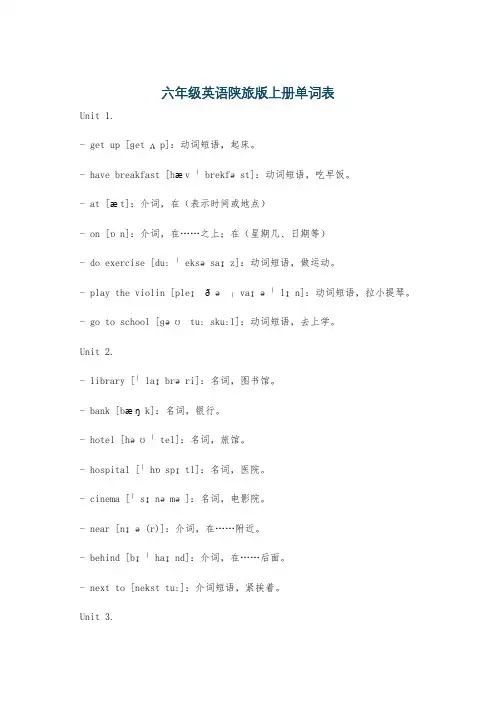
六年级英语陕旅版上册单词表Unit 1.- get up [ɡet ʌp]:动词短语,起床。
- have breakfast [hæv ˈbrekfəst]:动词短语,吃早饭。
- at [æt]:介词,在(表示时间或地点)- on [ɒn]:介词,在……之上;在(星期几、日期等)- do exercise [du: ˈeksəsaɪz]:动词短语,做运动。
- play the violin [pleɪðəˌvaɪəˈlɪn]:动词短语,拉小提琴。
- go to school [ɡəʊ tu: sku:l]:动词短语,去上学。
Unit 2.- library [ˈlaɪbrəri]:名词,图书馆。
- bank [bæŋk]:名词,银行。
- hotel [həʊˈtel]:名词,旅馆。
- hospital [ˈhɒspɪtl]:名词,医院。
- cinema [ˈsɪnəmə]:名词,电影院。
- near [nɪə(r)]:介词,在……附近。
- behind [bɪˈhaɪnd]:介词,在……后面。
- next to [nekst tu:]:介词短语,紧挨着。
Unit 3.- week [wi:k]:名词,周;星期。
- today [təˈdeɪ]:名词,今天。
- Sunday [ˈsʌndeɪ]:名词,星期日。
- Monday [ˈmʌndeɪ]:名词,星期一。
- Tuesday [ˈtju:zdeɪ]:名词,星期二。
- Wednesday [ˈwenzdeɪ]:名词,星期三。
- Thursday [ˈθɜ:zdeɪ]:名词,星期四。
- Friday [ˈfraɪdeɪ]:名词,星期五。
- Saturday [ˈsætədeɪ]:名词,星期六。
Unit 4.- season [ˈsi:zn]:名词,季节。
- spring [sprɪŋ]:名词,春天。
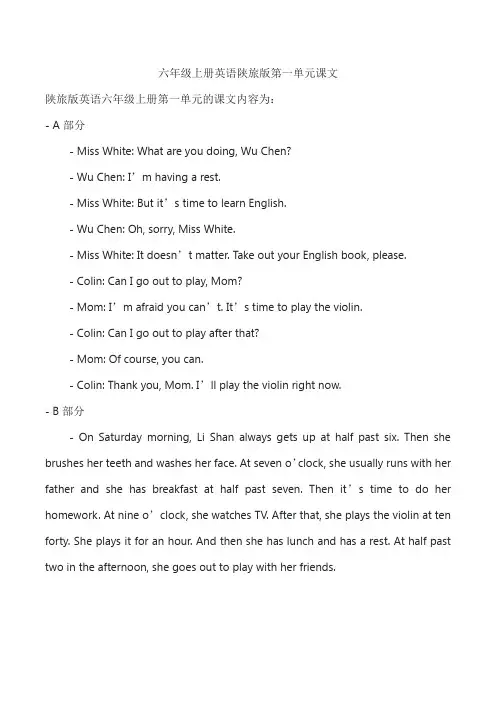
六年级上册英语陕旅版第一单元课文陕旅版英语六年级上册第一单元的课文内容为:- A部分- Miss White: What are you doing, Wu Chen?- Wu Chen: I’m having a rest.- Miss White: But it’s time to learn English.- Wu Chen: Oh, sorry, Miss White.- Miss White: It doesn’t matter. Take out your English book, please.- Colin: Can I go out to play, Mom?- Mom: I’m afraid you can’t. It’s time to play the violin.- Colin: Can I go out to play after that?- Mom: Of course, you can.- Colin: Thank you, Mom. I’ll play the violin right now.- B部分- On Saturday morning, Li Shan always gets up at half past six. Then she brushes her teeth and washes her face. At seven o’clock, she usually runs with her father and she has breakfast at half past seven. Then it’s time to do her homework. At nine o’clock, she watches TV. After that, she plays the violin at ten forty. She plays it for an hour. And then she has lunch and has a rest. At half past two in the afternoon, she goes out to play with her friends.。
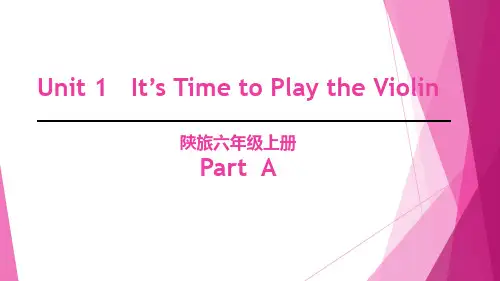
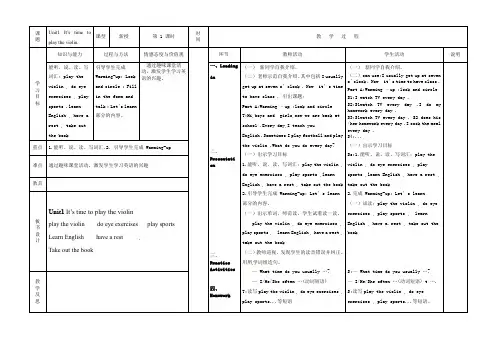
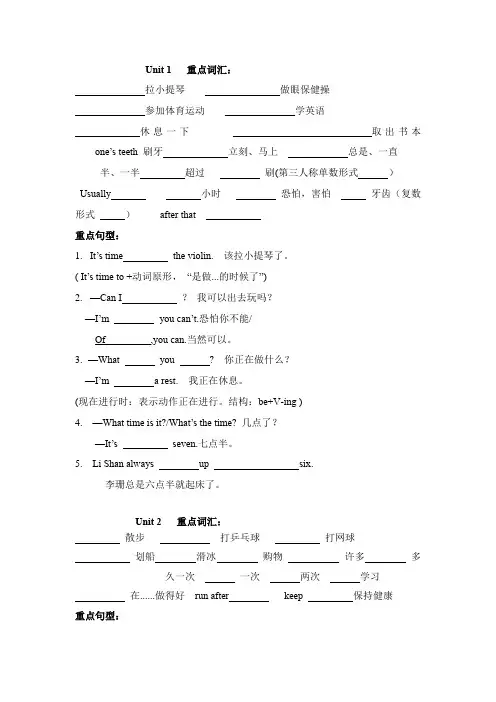
Unit 1重点词汇:拉小提琴做眼保健操参加体育运动学英语休息一下取出书本one’s teeth 刷牙立刻、马上总是、一直半、一半超过刷(第三人称单数形式)Usually 小时恐怕,害怕牙齿(复数形式)after that重点句型:1.It’s time the violin. 该拉小提琴了。
( It’s time to +动词原形,“是做...的时候了”)2.—Can I ?我可以出去玩吗?—I’m you can’t.恐怕你不能/Of ,you can.当然可以。
3.—What you ? 你正在做什么?—I’m a rest. 我正在休息。
(现在进行时:表示动作正在进行。
结构:be+V-ing )4.—What time is it?/What’s the time? 几点了?—It’s seven.七点半。
5.Li Shan always up six.李珊总是六点半就起床了。
Unit 2 重点词汇:散步打乒乓球打网球划船滑冰购物许多多久一次一次两次学习在......做得好run after keep 保持健康重点句型:1.I’m . 我是健康的。
2.— do you drink milk? 你多久喝一次牛奶?—I drink milk . 我每天喝一次牛奶。
3.— does Li Shan go ? 李珊多久滑一次冰?—She goes skating .她一周滑一次冰.4.You look . 你看起来很健康。
5.I eat fruits and vegetables. 我吃许多水果和蔬菜。
6.She her . 她在学习方面表现得好。
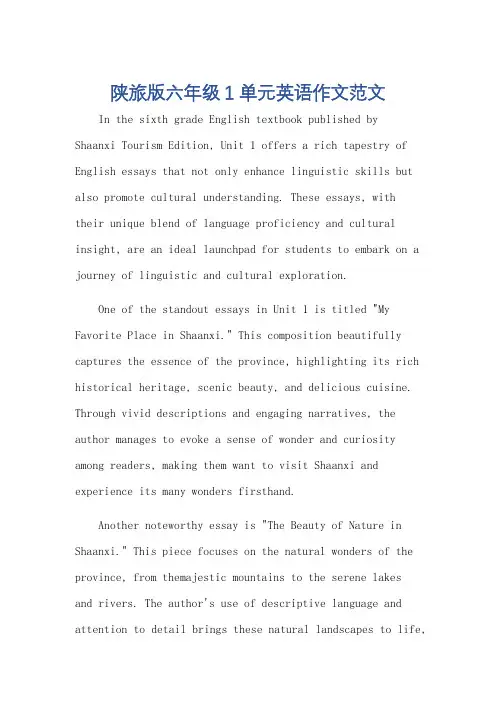
陕旅版六年级1单元英语作文范文In the sixth grade English textbook published byShaanxi Tourism Edition, Unit 1 offers a rich tapestry of English essays that not only enhance linguistic skills but also promote cultural understanding. These essays, withtheir unique blend of language proficiency and cultural insight, are an ideal launchpad for students to embark on a journey of linguistic and cultural exploration.One of the standout essays in Unit 1 is titled "My Favorite Place in Shaanxi." This composition beautifully captures the essence of the province, highlighting its rich historical heritage, scenic beauty, and delicious cuisine. Through vivid descriptions and engaging narratives, the author manages to evoke a sense of wonder and curiosity among readers, making them want to visit Shaanxi and experience its many wonders firsthand.Another noteworthy essay is "The Beauty of Nature in Shaanxi." This piece focuses on the natural wonders of the province, from themajestic mountains to the serene lakesand rivers. The author's use of descriptive language and attention to detail brings these natural landscapes to life,allowing readers to imagine themselves standing amidsttheir grandeur.What's more, the essay "Cultural Exchange in Shaanxi" shines a spotlight on the province's vibrant cultural scene. It highlights the various cultural activities and exchanges that take place in Shaanxi, such as folk dances, art exhibitions, and cultural festivals. This essay not only enhances students' understanding of Shaanxi's rich cultural heritage but also encourages them to actively participatein cultural exchanges and promote cross-cultural understanding.The inclusion of these essays in the sixth gradeEnglish textbook is not just about improving students' language skills; it's also about fostering a sense of pride and belonging towards their own culture. By delving intothe unique characteristics of Shaanxi's culture and history, these essays help students appreciate their own cultural roots and understand the diverse cultural landscapes of China.In addition to cultural exploration, these essays also serve as excellent examples of effective writing. Theydemonstrate the importance of clear organization, coherent paragraph structure, and engaging language use. By analyzing and imitating these essays, students can improve their own writing skills and develop a more nuanced understanding of the English language.Overall, the essays in Unit 1 of the Shaanxi Tourism Edition sixth grade English textbook are a treasure trove of linguistic and cultural knowledge. They provide students with an opportunity to enhance their English proficiency while also gaining insights into the rich cultural heritage of Shaanxi. Through these essays, students can embark on a journey of linguistic and cultural exploration that will not only enrich their academic experiences but also shape their understanding of the world.**六年级英语之旅:深度解读陕旅版单元范文**在陕西旅游版六年级英语教材中,第一单元的作文范文为我们呈现了一幅丰富多彩的语言画卷。
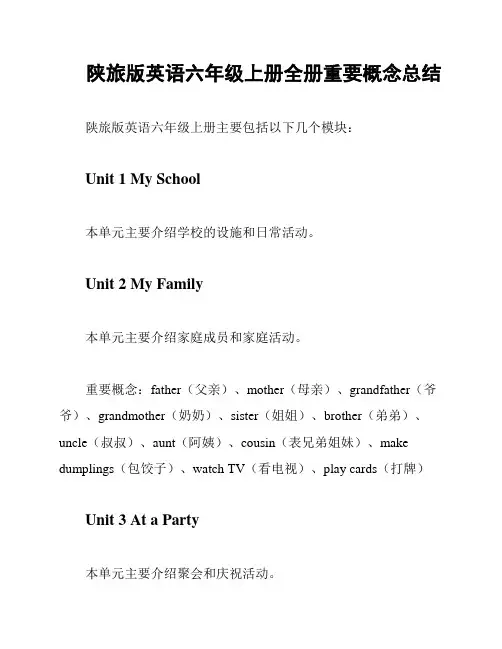
陕旅版英语六年级上册全册重要概念总结陕旅版英语六年级上册主要包括以下几个模块:Unit 1 My School本单元主要介绍学校的设施和日常活动。
Unit 2 My Family本单元主要介绍家庭成员和家庭活动。
重要概念:father(父亲)、mother(母亲)、grandfather(爷爷)、grandmother(奶奶)、sister(姐姐)、brother(弟弟)、uncle(叔叔)、aunt(阿姨)、cousin(表兄弟姐妹)、make dumplings(包饺子)、watch TV(看电视)、play cards(打牌)Unit 3 At a Party本单元主要介绍聚会和庆祝活动。
重要概念:birthday(生日)、party(聚会)、cake(蛋糕)、candles(蜡烛)、sing songs(唱歌)、dance(跳舞)、open presents(打开礼物)Unit 4 At the Zoo本单元主要介绍动物和动物园。
重要概念:elephant(大象)、giraffe(长颈鹿)、lion(狮子)、tiger(老虎)、panda(熊猫)、monkey(猴子)、kangaroo (袋鼠)、zoo(动物园)Unit 5 What are you doing?本单元主要介绍日常活动,以及动词的现在进行时态。
重要概念:swim(游泳)、run(跑步)、jump(跳)、hop (单脚跳)、skip(跳绳)、draw(画画)、sing(唱歌)、dance (跳舞)Unit 6 At the Airport本单元主要介绍机场和乘坐飞机的过程。
重要概念:passport(护照)、ticket(机票)、boarding pass (登机牌)、security check(安检)、luggage(行李)、baggage claim(行李领取处)、take off(起飞)、land(降落)总之,六年级上册是英语学习的一个重要阶段,掌握以上重要概念可以更好地帮助学生理解对应的英语知识点,从而提高英语水平。

陕旅版小学六年级上册知识汇总Unit 1 It’s Time to Play the Violin一、重点单词1、v in(小提琴)2、l n(学习)3、m tter(要紧;重要)4、afr d(恐怕;害怕)5、ways(总是;一直)6、h f(半;一半)7、p ss(超过;超出)8、b sh(刷;擦)9、t th(牙齿)10、o’clo ......(点钟)11、u ally(通常;常常)13、h r(小时)二、短语1、the violin(拉小提琴)2、do eye (做眼保健操)3、play (参加体育活动)4、English(学英语)5、have (休息一下)6、the book (取出书本)7、now(立刻;马上)三、句型及习题。
1、询问自己是否能做某事。
Can I +V.(原)?我可以......吗?例:--I’m afraid you can’t... be afraid(恐怕)2、到了该做某事的时间了。
It’s time to...例:-It’s time to play the violin.练习题,汉译英:(1)到了学习英语的时间了。
(2)到了该唱歌的时间了。
3、询问某人正在做什么(回答语的动词应是-ing形式)对以下习题填空你正在做什么?-动词称用are-I (be) (have) a rest.你的哥哥正在做什么?-动词称用is-He (be) (read) a book.4、-I’m sorry, -It .(填空)5、She always (run) with her father.6、half past+基数词“几点半”基数词+o’clock “几点整”翻译:九点半七点半9点7、选择正确词填空(on,in)Saturday morning,Li Shan always (get) up(at ,on)half past six.8、介词in的用法,in 年in月,in四季,上午下午和晚上。
英语六年级上册陕旅版1~4单元范文Unit 1 My SchoolHello, everyone! My name is Lily and I am in grade six. Today, I want to talk to you about my school.My school is called Sunshine Elementary School. It is a beautiful school located in a quiet neighborhood. The school building is big and bright, with a playground at the back. There are also many trees and flowers around the school, which makes it a wonderful place to study.In my school, we have many classrooms, a library, a computer room, a science lab, and a gym. The classrooms are spacious and well-lit, with colorful decorations on the walls. The library is filled with all kinds of books, from fairy tales to encyclopedias. The computer room has modern computers and internet access, which we use for research and learning. The science lab is equipped with all kinds of tools and equipment for conducting experiments. And the gym is where we have our physical education classes.We have a great team of teachers at Sunshine Elementary School. They are all very kind, patient, and knowledgeable. They make learning fun and exciting for us. They also organize manyextracurricular activities, such as field trips, sports events, and talent shows.I love my school because it is a place where I can learn, grow, and make friends. I have made many wonderful memories here and I will always cherish them. I am proud to be a student of Sunshine Elementary School.Unit 2 NumbersNumbers are an important part of our daily lives. We use numbers to count, measure, calculate, and so much more. In this unit, we will learn about different types of numbers and how to use them.First, let’s talk about ca rdinal numbers. Cardinal numbers are used to count things. For example, one, two, three, four, five, etc. We use cardinal numbers when we want to know how many of something there is.Next, let’s talk about ordinal numbers. Ordinal numbers are used to show the order or position of something. For example, first, second, third, fourth, fifth, etc. We use ordinal numbers when we want to say which position something is in.We also have fractions, decimals, and percentages. Fractions show parts of a whole, decimals show numbers in between wholenumbers, and percentages show parts of a hundred. We use fractions, decimals, and percentages in many different situations, such as cooking, shopping, and finance.Finally, let’s not forget about negative num bers and zero. Negative numbers are numbers less than zero, and zero is a number that represents nothing. We use negative numbers and zero in math, science, and many other fields.Numbers are everywhere around us. By understanding different types of numbers and how to use them, we can make sense of the world and communicate with others effectively.Unit 3 My FamilyFamily is the most important thing in the world. In this unit, we will learn about family members, family relationships, and family traditions.I have a big family. My family consists of my parents, my grandparents, my siblings, and my cousins. We all live in the same house and we get along very well. My parents are loving and caring, and they always make sure that we have everything we need. My grandparents are kind and wise, and they tell us stories about their childhood. My siblings are my best friends,and we do everything together. And my cousins are like my siblings, and we have so much fun when we are together.Family relationships are very important. We show love, respect, and support to our family members. We help each other, listen to each other, and spend quality time together. We celebrate special occasions together, such as birthdays, holidays, and family reunions. Our family traditions include cooking traditional dishes, playing traditional games, and singing traditional songs.I am very grateful for my family. They are always there for me, no matter what. They give me strength, happiness, and love. I am proud to be a part of this wonderful family.Unit 4 My HobbiesHobbies are activities that we enjoy doing in our free time. In this unit, we will learn about different hobbies and how to talk about them.I have many hobbies. One of my hobbies is playing the piano.I have been playing the piano for five years now and I love it. I practice every day and I have performed in many concerts. Playing the piano relaxes me and makes me happy.Another one of my hobbies is reading. I love reading all kinds of books, from novels to magazines. Reading takes me to different worlds and teaches me new things. I also enjoy discussing books with my friends and recommending books to each other.My third hobby is drawing. I love to draw pictures of nature, animals, and people. Drawing helps me express myself and be creative. I also like to paint with watercolors and experiment with different techniques.In addition to these hobbies, I also enjoy playing sports, cooking, and gardening. Sports keep me fit and healthy, cooking allows me to try new recipes, and gardening helps me relax and connect with nature.Hobbies are a great way to relax, have fun, and learn new things. They bring us joy and fulfillment. I encourage you to find a hobby that you love and make time for it in your busy schedule.That's all for now. Thank you for listening. See you next time!。
陕旅版英语六年级上册知识点汇总I'm sorry。
XXX。
I XXX paragraph:Unit 1 It's Time to Play the linVocabulary to memorize includes playing the lin。
doing eye exercises。
playing sports。
learning English。
taking a break。
taking out a book。
brushing teeth。
and more。
Common phrases include "It doesn't matter," "Of course。
you can," and "Thank you." nally。
XXX the time to do something and describing daily habits.Unit 2 I'm XXXXXX exercise。
eating fruits and vegetables。
drinking water。
XXX sleep。
Common phrases include "I'm sorry," "That's okay," and "You're e." nally。
XXX.Unit 3 XXX?XXX swimming。
hiking。
camping。
and sightseeing。
Common phrases include "That sounds fun," "I agree," and "Let's go." nally。
XXX.Unit 4 How Do You Go to School?XXX walking。
六年级上册英语单词表陕旅版陕旅版六年级上册英语单词表:Unit 1.1. get up [ɡet ʌp] (动词短语)起床。
2. have breakfast [hæv ˈbrekfəst] (动词短语)吃早饭。
3. go to school [ɡəʊ tuː skuːl] (动词短语)去上学。
4. lesson [ˈlesn] (n. 名词)课;课程。
5. first [fɜːst] (num. 数词;adj. 形容词)第一;首先的。
6. term [tɜːm] (n. 名词)学期。
7. back [bæk] (adv. 副词)回(原处);向后。
8. after [ˈɑːftə(r)] (prep. 介词)在……之后。
9. lunch [lʌntʃ] (n. 名词)午餐。
10. playground [ˈpleɪɡraʊnd] (n. 名词)操场。
11. lesson [ˈlesn] (n. 名词)课;课程。
12. then [ðen] (adv. 副词)那么;然后。
13. like [laɪk] (v. 动词)喜欢;喜爱。
14. let's = let us [lets] (让我们)15. go [ɡəʊ] (v. 动词)去;走。
16. swimming [ˈswɪmɪŋ] (n. 名词)游泳。
17. idea [aɪˈdɪə] (n. 名词)主意;想法。
18. hot [hɒt] (adj. 形容词)热的;辣的。
Unit 2.1. autumn [ˈɔːtəm] (n. 名词)秋天;秋季。
2. cool [kuːl] (adj. 形容词)凉爽的;酷的。
3. winter [ˈwɪntə(r)] (n. 名词)冬天;冬季。
4. cold [kəʊld] (adj. 形容词)寒冷的。
5. fly [flaɪ] (v. 动词)飞;放飞(风筝等)6. kite [kaɪt] (n. 名词)风筝。